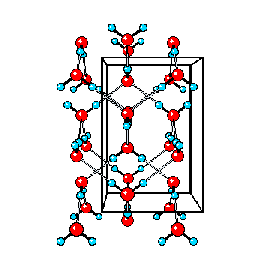Molecular Dynamics Modeling
Welcome to CSI 786/CHEM 579/CDS 461
Tuesdays 4:30-7:10 PM, Research Hall 249
Instructor:
Estela Blaisten-Barojas
Office: Research Hall 221, phone: 703-993-1988
Office hours: upon request
SPRING 2019

The course is part of the Computer Modeling and Simulation emphases
of the doctoral program in Computational Sciences and Informatics and the master's in Computational Science , is an elective topics course in the PhD in Chemistry (register in CHEM 579), and is additionally an elective topics course in the Computational and Data Sciences BS Computational and Data Sciences BS.
Theme of the course: Molecular Dynamics Simulation
Molecular dynamics methods are now orthodox means for simulating
molecular-scale models of matter. The methods were originally devised in the 1950's,
began to receive widespread attention in the mid-1970's, and are today
a fundamental scientific approach to design nano systems, as well as bulk crystals, glasses, liquids, polymers,
surfaces, and interfaces. Additionally, the methodology has been adopted by computational biologists, and is today an
essential element of bio-oriented research.
Molecular dynamics methods solve numerically the N-body problem of classical mechanics.
Its importance shows when studying how atoms self-assemble into ordered
or disordered solid materials, how molecules in solution self-assemble into structures such as
micelles, how fluid around an object produces a turbulent wake, how a local
disturbance on a few molecules propagates throughout a system in the condensed
phases, among other important natural phenomena.
This server will expand as the semester progresses.
Textbooks and Course Materials
The textbook for this course is:
Molecular Dynamics Simulation
, by J. M. Haile, John Wiley, 1997.(ISBN-13: 978-0-471-18439-3), paperback or hardcopy
A suplemental textbook is:
Understanding Molecular
Simulation, by Daan Frenkel and Berend Smit, Academic Press, 2nd edition 2004.
Other relevant material will be taken from:
Graduate students grade for this class will be based on your performance:
Homeworks, 8-10 during the semester (estimated 40% of grade, may change)
Individual project:
project description (estimated 30% of grade, may change),
Class presentations by students on the material and examples based on the textbook, class notes, attendance, etc (estimated 30% of grade, may change).
The homeworks will be portions needed to build a common class project. This project will be the same for the full class and will be built sequentially by the addition of different parts left as homework.
Each student will choose the subject of an individual project (to my approval concerning its
feasibility). The final individual project will undergo two stages. In the first a
"hands-in" draft will be produced, for reviewing by two referees: one of your
classmates and myself. The second stage will consist of a final written project
report and a final presentation in the form of a scientific conference ccontributed work.
Students in the CDS 461 co-taught class will only need the class project in which they will add one extra property to be simulated. The report will follow the same guidelines given in project description for everybody else.
-- Notes will be available electronically in a password protected website.
-- Computers in this classroom are accessible to you either in person when the lab is accessible or remotely through ssh (or putty) at yourmasonID@cdsXX.mesa.gmu.edu. You need to loggin first into mason.gmu.edu and from there connect to these machines.
-- The honor code will be enforced
-- Cell phones, smart phones, or equivalent gadgets are to be turned off during the class. No recording allowed.
-- Email announcements, communications, homework, etc, will be sent to your
Mason account. Students that prefer to use a different email should create
a "forward" from the university account to their desired email address.

Estela Blaisten-Barojas, blaisten-at-gmu.edu

